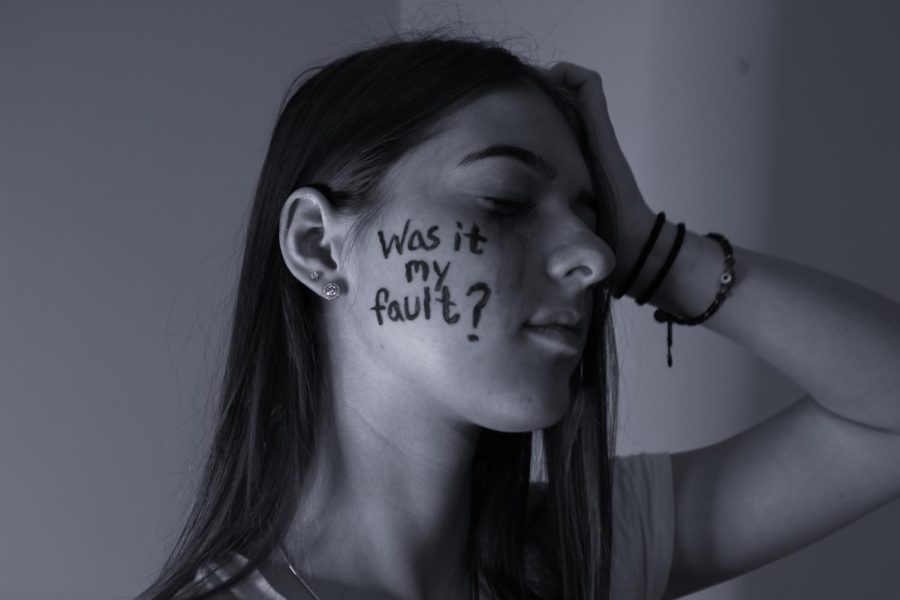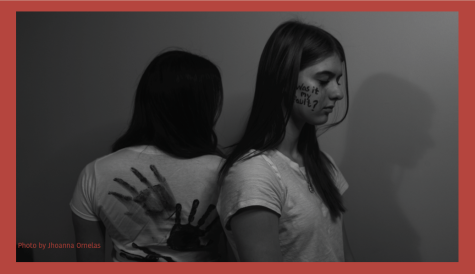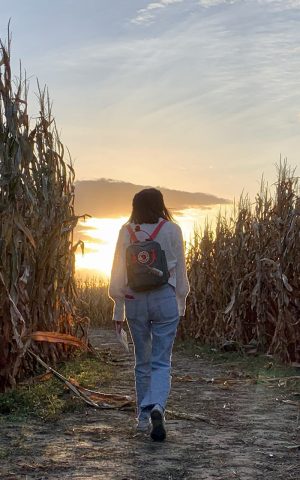One In Six
One in six Americans are victims of sexual assault. These are their stories…
October 24, 2022
A trusting girlfriend in a toxic relationship. A preteen staying at a friend’s house. A five-year-old spending time with family. A small child confused with the world. And a first date gone awry. From a third-party perspective, it may seem that these people and millions of others have nothing in common, but they are all bonded by the haunting memories of pain and dehumanization inflicted on all victims of sexual assault. These are their stories*.
While rape and sexual assault statistics are always changing, in America, roughly 1 in 6 people will be or have already been sexually assaulted or raped. According to a study put on by The Rape, Abuse & Incest National Network, RAINN, In 1998, an estimated 17.7 million women and 2.78 million men in America have been sexually assaulted or raped.
Social worker Donna Holmes specialized in child sexual assault counseling before moving into a school setting.
“As a school social worker, my job is to support students in any way that’s going to help them be more successful in school […] If some sort of emotional or social issue is a barrier to them coming to school or doing well in school, taking care of themselves, that’s what I am here for,” Holmes said.
Holmes has worked at the school for about three years, and while barely a dozen people have come forward to report a sexual assault case, she speculates that students are scared to come forward.
“Sometimes people keep it secret because they are ashamed. Sometimes they feel like it’s their fault. A lot of times people don’t tell because they have been threatened [by their abuser]. Maybe it’s someone that they love […]” Holmes said.
The dictionary definition states sexual assault is “nonconsensual touching of one person for the sexual gratification of another,” meaning; sexual assault can take many forms, whether it be inappropriate touching or groping, unwanted kissing, or rape.
Olivia is an artistic junior who likes to spend her time sewing and embroidering. As a kid, she was an outgoing, fun-loving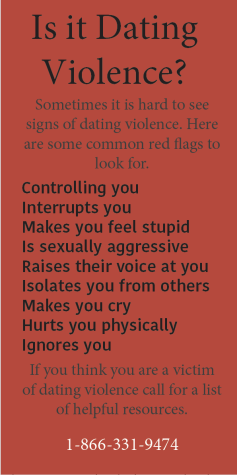 girl that would talk to everyone. However, at 14 years old, that young girl had changed completely, burdened by the memories of the abuse by someone she thought loved her.
girl that would talk to everyone. However, at 14 years old, that young girl had changed completely, burdened by the memories of the abuse by someone she thought loved her.
“We met at school, through a mutual friend. I was new to the district and he was friends with someone I was really close with. They introduced me to him, he told me that he liked me and I told him I asked him if he wanted to be a thing […] It all went to crap after that. It started off pretty normal. There was a lot of love bombing involved, […] he would tell me ‘I am so glad to have you in my life, I don’t know what I would do without you,’” Olivia said.
What seemed like a dream to Olivia quickly turned into a nightmare, one night when her boyfriend took things too far. Feeling a little sick to her stomach, Olivia asked to reschedule her date, this was met with a violent outburst of yelling from her boyfriend.
“I liked him at first, I wanted to be intimate. There was one moment though that I didn’t want to be intimate, and it completely changed the whole dynamic of everything. He was like, ‘If I am not going to get sex from you why am I even here? I will have to go find it from someone else, there are plenty of people begging to give it to me,’ [he would say] stuff like that,” Olivia said.
Feeling trapped and scared to lose her boyfriend Olivia gave into the begging and was eventually coerced. He proceeded to force himself onto her.
“Sometimes I wonder if I can even blame him, I don’t think he fully understands that I didn’t say yes because I wanted to, but I did it because I was scared of what would happen if I said no again,” Oliva said.
After the assault, Oliva spent four months with her boyfriend living in silent hatred, each time she would try to leave
Olivia was immediately threatened and silenced. Completely alone, she processed the trauma for almost a year until she was finally able to accept that she was in fact raped.
“[…] I remember just sitting in my bed just sobbing thinking, what did I do to deserve that? I thought why am I so unlucky? Like, why did this have to happen to me? And then you know, it happened again to someone else. And then I realized that it’s not a me thing,” Olivia said.
Shortly after Oliva, her abuser proceeded to rape two more girls, each with similar stories. When she came forward to the school, an investigation took place but came back with nothing. The abuser denied all accusations by campaigning that “regretted sex isn’t rape,” when in actuality it wasn’t ever wanted.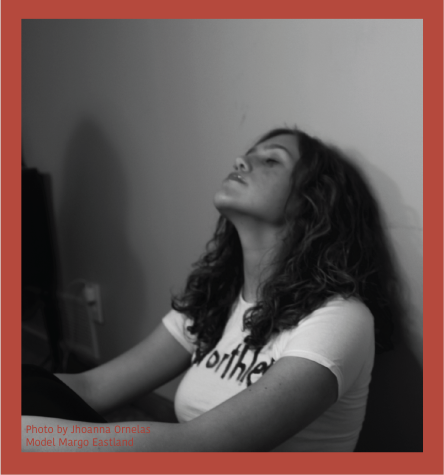
Sexual assault can happen to anyone. No matter the race, sexuality, or gender of the victim. Alex is a sophomore that identifies as nonbinary. When they were 12 years old, they were spending the night at a friend’s house after a hot summer day spent at the pool. Alex, their best friend, and their friend’s 16-year-old brother spent the day swimming. Alex stood in their two-piece bathing suit and hot pink jacket in front of their best friend’s older brother, alone and unsuspecting of the event that was about to take place.
Alex was soon trapped in a dark room, the only light was the soft glow of the TV screen and a 16-year-old boy.
“I didn’t know how to get out of there. He was kind of like grabbing my leg and pulling me over to where he was laying […] He had me like kind of [leaning] on top of him, he pulled my wrists, to his side. And like with one arm and the other one was like, feeling up my jacket. I felt and saw him go up my jacket and into like the top part of my swimsuit.” Alex said.
He began to touch 12-year-old Alex inappropriately. Being so young at the time Alex was unable to fully realize what had happened. Still, they were able to fight off their attacker and run upstairs and lock themself in the bathroom.
“I remember looking in the bathroom mirror and feeling so just confused, afraid, and hurt. I was kind of like, what am I going to do? I feel like one of the lowest points in my life was probably like just sitting in that bathroom […] I went into the kitchen and I was just looking for anything [I could use] to kill myself. I didn’t really know why at the moment. I felt like I couldn’t do this anymore. I felt so much pain,” Alex said.
Alex never came forward about their assault until this interview.
Unfortunately, those like Alex are more likely to experience these events in their lifetime. In recent years there has been an increase in sexual assault toward members of the LGBTQ+ community. In a survey of college students, done by RAINN 23.1% of student victims were part of the LGBTQ+ community and identified mainly as transgender.
Along with race, gender, and sexuality, age also plays a big role in sexual assault cases. While many cases of rape and sexual assault take place between the ages of twelve and thirty, this is not always the case.
Jamaya is a bookworm who has a deep love of music, her friends would describe her as energetic and hilarious to be around. Her big round glasses and big smile make her light up a room, but behind that smile of hers is a secret almost no one knows.
Starting at the age of five Jamaya was molested numerous times by her uncle.
“My parents divorced when I was really young, and so whenever I would go on, visits with my dad, we would go to visit my grandparents on that side. And so, we kind of just [started] hanging out with him and stuff. We would just be playing, and he would just touch me and do things that he shouldn’t have been doing with a child,” Jamaya said.
As a young child, Jamaya was blind to what was happening. She went on without saying anything to her other family members for nearly five years, quietly enduring what her uncle was doing to her.
“I don’t remember exactly how it came up. But I ended up, telling my mom at some point, and she was like, ‘Oh, my God, like, you never told me.’ Then, I was able to get a restraining order against him,” Jamaya said.
The process of getting a restraining order was not one Jamaya was involved with because she was so young, instead, her mother handled the process. Jamaya has not seen her uncle since.
Though her abuser is out of her life, Jamaya still struggles with the trauma. Jamaya suffers from repression, meaning that she replaced the traumatic memories of her assault. The human brain uses repression as a coping mechanism and is commonly found in people with PTSD.
“It happened when I was really young. I think I just forgot about it for so long. Then it all kind of, resurfaced, and it definitely made me more afraid of just men in general. [it gave me] a lot more trust issues.” Jamaya said.
The cycle of sexual abuse in children is a hard one to break. Studies show that when a child is molested by a close family member, it is common to see those children pick up some of those traits. This rings true in Abigail’s story.
As a 7-year-old Abigail was in her elementary school library with one of her best friends at the time. To Abigail, he was a normal boy with an ok homelife, nothing out of the ordinary.
“He kind of put his hand near my pants and just started like, going closer, and then [he slipped his hand] under my underwear and rubbed my private parts. It was just really weird.I didn’t know what to think. I just froze, it happened for a few minutes. I didn’t say anything. The librarian was right there. But I just didn’t say anything,” Abigail said.
Abigail knew immediately something wasn’t right with the incident that had occurred. She immediately told her parents, who then took it to the principal. They took the allegation seriously and an investigation took place.
“I actually found out that he was getting molested by his parents. And that’s why he did it to me. It was happening for years Abigail said.
After the investigation with CPS, Abigail’s friend was removed from the school, she hasn’t seen him since.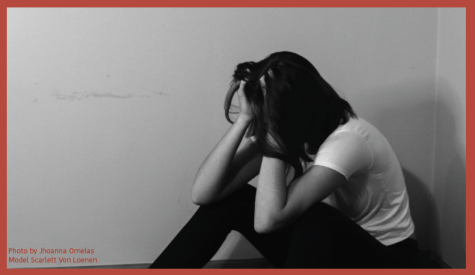
Abigail has moved on from feeling maimed by her nonconsensual touching but still thinks about her friend a lot. She has no ill wishes for the young boy, she knows that he was too young to understand and know better. She can only hope he has been relocated into a safe place where he can have a brighter future.
According to the U.S Department of Health and Human Services Child Maltreatment Report, roughly every nine minutes CPS finds evidence of child sexual abuse, children who suffer sexual abuse become four times more likely to suffer PTSD and drug abuse.
It is easy to ignore the topic of sexual assault, it is easy to think that something like it would never happen to you. Nothing like this would happen at your school, however, this sentiment is far from the truth.
The school cages have been a hot spot for students to sneak into while skipping class or assemblies. They hold the old sports equipment and old theater set props and was the only witness to the assault of Gabriela.
Gabriela is an adventurous senior who loves to spend her time outdoors and with friends. On the outside, she seems like the stereotypical always-happy teenage girl, but the truth is she carries around serve anxiety. During freshman year she asked a boy she had a crush on to a basketball game. Eager to get to know each other, they snuck into the school basement to talk after the game
“He kissed me and wouldn’t stop, his hand started to move all over my body. I wasn’t super comfortable with it, but I wasn’t necessarily super uncomfortable. I didn’t have any romantic experiences with guys, so I didn’t know what it was supposed to look like. So I just assumed that that was normal,” Gabriela said.
Minutes passed and he wouldn’t stop. His movements and groping kept getting worse.
“Then he really started to touch me. And I was very, very uncomfortable. And I knew I didn’t want what was happening. I asked him to stop. And he told me no […] my back was against a wall and he was in front of me so I didn’t really have a way to get out. He was much taller than me and a lot stronger […] I just kept telling him to stop and he wouldn’t. I just didn’t know what to do,” Gabriela said.
After saying no and trying to fight him off for minutes, her abuser finally let her go. After this event, Gabriela suffered severe panic attacks, was unable to eat or sleep, and began suffering from depression. In order to treat these issues, her parents got her in contact with a therapist.
“I went to therapy and that was something that was never covered […] I went to therapy for four months. And we never touched on it,” Gabriela said.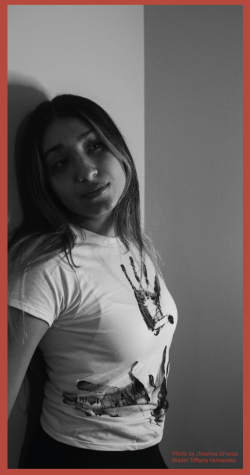
While she was sure her therapist was aware of her sexual assault, the therapist still continued to avoid the topic. Gabriela wanted to bring it up but was unable to relive the events of that night, so it in the end it was never discussed. She also refrained from coming forward to the school. Since her attack, the school has begun taking measures to prevent something like this from happening again, mainly by blocking off the basement during events within nonschool hours.
Sexual assault is real and is happening every day, all over the country, all over the world. So why is it such a taboo?
While all sexual assault stories are different they all share the common theme of feeling shameful, hopeless, and utterly helpless. Many victims find themselves feeling broken and or blaming themselves.
For people in a situation of sexual abuse, there are many resources that can help. One of these resources is the Metropolitan Organization to Counter Sexual Assault (MOCSA), which focuses specifically on sexual abuse counseling for the victims as well as perpetrator counseling for the abusers.
It is very uncommon for students to come forward to the school after an assault. Holmes recounted only seeing a dozen kids a year.
When a minor comes forward with a sexual assault accusation the school must take serious action in order to protect the victim. According to Holms the first step they must take is calling Child Protective Services (CPS), this is to ensure a full-scale investigation can take place.
“Their job is to get the facts and then take the next steps. Is the person safe? what do we need to do with that other person? Is there a legal issue, verses, if it’s another minor do we need to get them help? They also work with their family to determine if they are safe, making sure that the person [who abused them] does not have access to them anymore,” Holmes said.
The most important thing to Holmes is the safety of the students.
“You guys need to talk to each other more about sexual assault to get rid of the shame. As an adult, you can tell us, there is no reason to be embarrassed, but until teenagers hear it from other teenagers, I don’t know if they are going to fully embrace it,” Holmes said.
If there was a lesson to learn from the stories of these five students, it is that no victims are alone. While it may be an uncomfortable conversation, it is one that needs to happen. It is important for people to talk about sexual assault so that the stigma can go away and victims no longer feel shame or guilt for what has happened to them. Sharing their stories and shining a light on this dark subject is the first step in healing for many victims, with all of them sharing the sentiment that it’s important to tell their stories.


